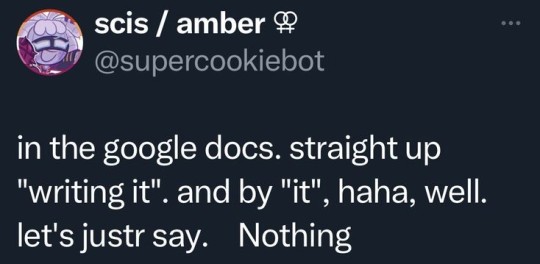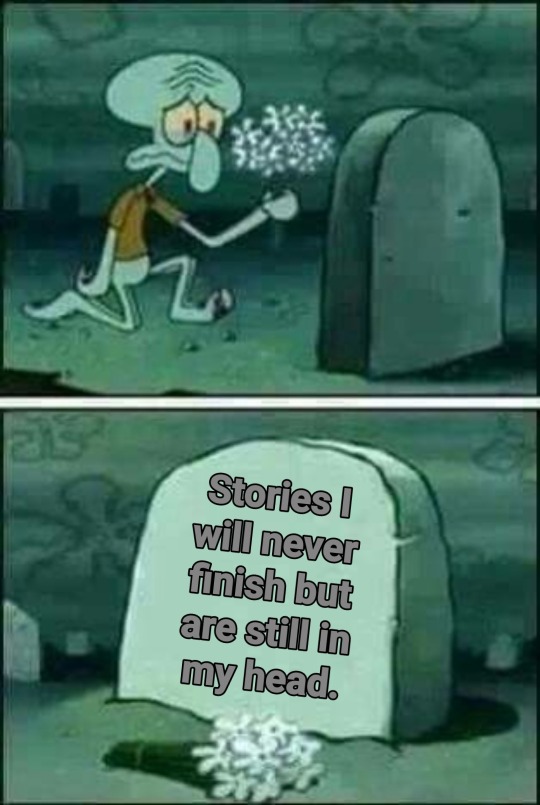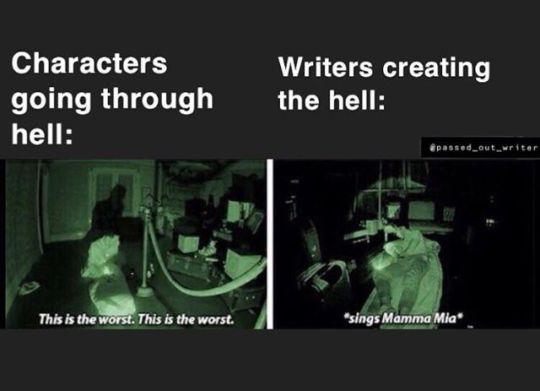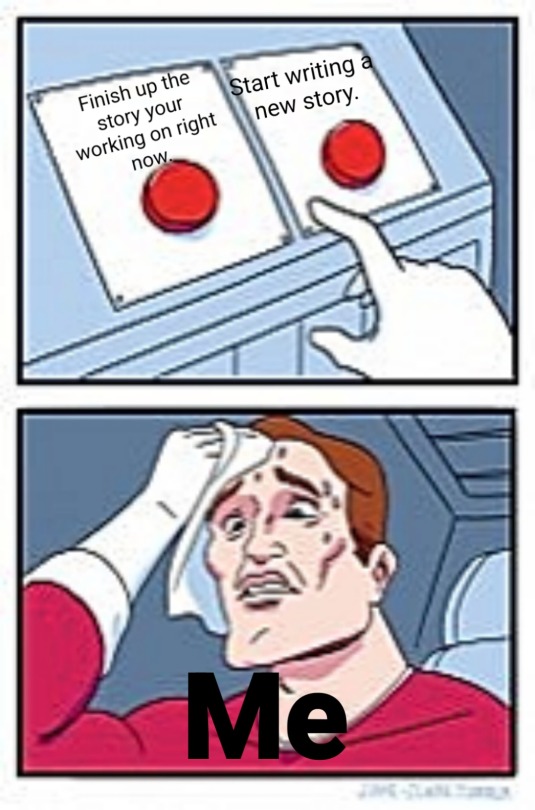#Being a Writer
Explore tagged Tumblr posts
Text

#fanfiction#writeblr#writer#writers#writing#writerscommunity#writblr#writer problems#writings#my writing#wip#write#being a writer#creative writing#female writers#fiction writing#just writer things#novel writing#writer life#writer meme#writer memes#writer struggles#writer stuff#writer things#writerblr#writers block#writers community#writers life#writers of tumblr#writers on tumblr
25K notes
·
View notes
Text
Never forgotten but...never finished.

#fanfiction#writing#writing memes#writing humor#life of a writer#writer blog#being a writer#writers on tumblr#writers#writeblr#writerscommunity#writer problems
10K notes
·
View notes
Text
A writers curse is when you become emotionally attached to the characters you planned to kill off
1K notes
·
View notes
Text
The Taste of the World: Writing Food as Storytelling

Food is never just food. It’s culture, history, survival, and, perhaps most importantly, a language that characters and worlds use to speak when words fail. The way food is grown, prepared, and consumed reveals the structure of a society—its priorities, its fears, and its memory. And in storytelling, the smallest detail about what’s eaten or how it’s shared can carry a world’s worth of meaning.
When used well, food becomes a subtle but powerful tool. It can reflect emotional tension without anyone saying a word, or quietly thread deeper themes through the narrative. It doesn’t have to overwhelm your story with excess description; it works best when it’s an organic part of the world, shaped by the same forces that drive everything else.
Let’s break down how to think about food as more than a detail, crafting it as an integral part of the characters, the setting, and the stakes.

Why Food is Fundamental to Worldbuilding
Culture and Identity
Food defines a culture as much as its language or traditions. The ingredients people rely on are determined by the land they inhabit, the technology they have access to, and the values they hold. It’s not just about what is eaten, but how—and why.
Think About:
What ingredients are unique to this region, and how did they come to rely on them?
How is food served—shared communally or divided by status?
Are there specific rituals tied to preparing or consuming meals?
These questions help frame food not as a decorative detail, but as a way to demonstrate how a culture lives and interacts with its environment.
Food as Survival
Food exists on a spectrum from abundance to scarcity, and its availability often tells the story of who holds power and who doesn’t. This doesn’t need to be stated outright—simple contrasts in what’s on the table (or missing from it) can highlight social divides or tensions.
Consider:
What foods are considered everyday staples, and what are reserved for moments of celebration or mourning?
How do people preserve food in harsh climates or through difficult seasons?
What compromises are made when survival is at stake?
Survival shapes cuisine, and cuisine, in turn, shapes the people. Food that may seem unremarkable to outsiders can carry in-depth meaning for those who rely on it to live.
Food as Memory
Meals are tied to memory in ways that few other experiences can match. They evoke places, people, and moments that might otherwise be forgotten. For characters, food can serve as a reminder of what was lost or what still needs to be protected.
Ask Yourself:
What does this food remind your characters of?
How does this memory shape their present choices?
What foods do they miss, and why can’t they have them anymore?
The emotional weight of food often lies in its connection to something larger—home, family, or an ideal that has slipped unreachable.

Integrating Food Into Your Narrative
The Subtle Art of Symbolism
Food works best as a storytelling element when it doesn’t announce itself. It’s not about drawing attention to the dish for its own sake but letting it naturally reinforce the scene or the character’s state of mind.
Example in Practice: A meal served quickly, with little conversation, could underscore a sense of unease or urgency. Meanwhile, the deliberate preparation of a dish might reflect care, control, or tradition.
It’s less about describing what’s on the plate and more about how the act of eating—or not eating—interacts with the story.
Building Tension Through Meals
Sharing food is inherently social, and like any social act, it can carry undercurrents of conflict or connection. Meals can be settings for negotiation, subtle power plays, or suppressed resentments. What’s not said during a meal can matter more than what’s served.
Think About:
Who prepares the food, and what does that say about their role or status?
What’s the mood at the table? Is the act of eating itself a kind of performance?
Are there unspoken rules about who eats first, how much they take, or what they avoid?
Food as tension is about the surrounding interaction, not the food itself.
Grounding the World in Small Details
Food is a powerful tool for grounding your world in a sense of place. By focusing on how ingredients are sourced, prepared, or consumed, you create an ecosystem that feels real without needing an info dump. A brief reference to a seasonal delicacy or the preparation of a daily staple can communicate volumes about the setting.
Use Sparingly: The best world building happens in glimpses. A short mention of pickling methods during a harsh winter or the fragrance of a common herb can paint a vivid picture without dragging the narrative down.

Applying Food to Character Development
What Food Says About Relationships
Meals are a social construct as much as they are a necessity. Who characters eat with, what they share, and how they interact during a meal reveal their connections—or lack thereof.
Consider:
Do your characters share food equally, or does one person dominate the meal?
Is a meal an act of kindness, a manipulation, or an obligation?
How does the way they eat reflect their personality?
Preferences, Habits, and Rituals
The foods a character gravitates toward can say as much about them as how they speak or dress. Perhaps a soldier instinctively chooses ration-style meals even in peacetime, or a merchant avoids exotic imports as a quiet protest against their origins.
Ask Yourself:
Does your character have a ritual or habit when it comes to food?
How do they react to unfamiliar dishes?
What’s their relationship with food—joy, necessity, or something else?

The Absence of Food
Every so often, what’s missing can be more telling than what’s present. A lack of food could signify poverty, oppression, or desperation. Even in abundance, what isn’t served can carry weight—certain foods might be taboo, seasonal, or too painful to prepare because of their associations.
The absence of food doesn’t need to be highlighted directly. Instead, its weight can be felt through the absence of conversation, the careful rationing of resources, or the visible strain it places on characters.

Final Thoughts: Food as a Storytelling Tool
Food is one of the most powerful yet understated tools in your storytelling arsenal. It connects your world to its people and its people to each other, revealing layers of culture, memory, and emotion without needing to over-explain.
When used thoughtfully, food doesn’t just flavor your story—it deepens it, grounding your world in something tangible and human. Instead of asking, What do my characters eat? ask, Why does it matter? Because when food becomes more than sustenance, it transforms into something far greater—a story in itself.

TAGLIST - dm or reply to be added 🫶🏾
@slenders1ckn3ss @lucistarsfire @fond-illusion @p00lverinecentral
#fantasy worldbuilding#writers on tumblr#writeblr#writer community#writerscommunity#queer writers#creative writers#writerblr#writerscorner#fantasy writer#fantasy writing#creative writing#writers#worldbuilding food#fantasy world#fantasy setting#fantasy#worldbuilding#world building tips#writer#aspiring writer#just writer things#being a writer#beginner writer#tumblr writers#writer life#writer on tumblr#writer problems#writer stuff#writer things
378 notes
·
View notes
Text

#writer#writing#writer memes#writer jokes#writer humor#being a writer#writer meme#writerblr#writer blog
644 notes
·
View notes
Text
I've hated reading my own writing for... basically ever. I've looked back so many times and cringed that I rewrote my entire book five times (I'm on my sixth, and hopefully last draft, now).
Recently though, I've found some peace with reading my own work. I've looked back and thought to myself: "damn, I wrote that. I don't know how I wrote that masterpiece, but I love it so much."
And that's such an accomplishment for me that I want to share it with you. I still want to burn a lot of it, but not all of it anymore.
#writeblr#writer#aspiring author#aspiring writer#being a writer#writer stuff#writers life#writer problems
101 notes
·
View notes
Text
"So you're a writer?"

#writblr#writeblr#writers on tumblr#writing community#writerscommunity#writers of tumblr#ouat rumple#writers community#writers on ao3#writers#being a writer#writers life#writer's life#writing humor#writing meme#writing memes#queue
117 notes
·
View notes
Text
"I'm so patient and also I do this for myself and not for approval and don't need instantaneous validation."
I say like a liar as I refresh the page to see if anyone has interacted with the thing I made yet.
#creative writers#artists#writer's problems#personal#dustbunny rambles#being a writer#being an rp-er to for that matter#le sigh
20 notes
·
View notes
Text
Being a writer is searching up the meaning of words you only know through context to make sure you can use it.
#me with 'pursed'#my writing#writeblr#writers#writing#writers on tumblr#writers and poets#writerscommunity#being a writer#writer goals#creative writing#fanfiction#remus lupin x reader#marauders x reader#sirius black x reader#remus lupin
174 notes
·
View notes
Text
world–building prompt:
describe a city from your world and their most important celebration, BUT from the perspective of someone who despises it…
i’ll be reblogging some of my favorite reads. PLEASE make sure to tag us in your post to this to have your writing be featured on the ledger!
#surprise prompt!#worldbuilding#worldbuilding prompt#creative writers#creative writing#fiction writing#writer stuff#writers#aspiring writer#being a writer#queer writers#writers and poets#writing inspiration#writing prompt ledgers#story writing#writing prompts#setting prompts#fic prompt#wip prompt#fantasy worldbuilding#writing community#write
20 notes
·
View notes
Text
I realized that i dont actually wanna write my fic. I just wanna explain the plot to the people in the fandom who love the same characters as me like we're all having a sleepover and I'm spilling tea to my (non-existent) friendgroup so we can all scream and giggle and gasp and go crazy over our fictional little guys tgt
#please tell me this is relatable#thank you#text post#text posts#fanfiction writer#fanfic writer#writer stuff#being a writer
17 notes
·
View notes
Text
The true struggle of a writer...especially one who writes as a hobby.

5K notes
·
View notes
Text
This is my first attempt at a new blog :) I’m not pretentious enough to become some huge content creator but I hope you follow me because I’m cool and also sort of a nerd ✨
<3 you can call me Hayden or Kat (my real name) or whatever you want, unfortunately I have the same name as a murderer so I’m banished to an alias for forever and eternity
<3 I’m Nineteen-and-a-half, and in undergrad (hopefully, eventually, law school) what I really, really, want is to be a writer, but there are no writing schools or programs with any meaningful connections where I live- unfortunately, in America’s butthole (Arkansas). I’m going to keep writing anyway but unfortunately I must have a day job (insert sad face)
<3 I’m writing a silly fantasy novel atm about twin princes who trade their souls for each other, and power, and love, and sacrifice, and all of the magnificent chaos that goes along with it. You may never get to read it but i hope you like the snippets and head canons i choose to share 😙
<3 I have three kids; more specifically two cats and a goldfish.
If you read all of this!! I love you !! Let’s be friends :)

#writing#writing community#author#novel writing#booklr#writlr#introductory post#writing advice#being a writer#female writers#book blog#fiction writing#fiction#fantasy#poetry#am querying#on writing#creative writing#novelist#aesthetic
47 notes
·
View notes
Text
A Character’s Flaws vs. Strengths

When it comes to balancing your character’s flaws and strengths, the goal is to create a multidimensional figure that feels real and relatable—someone who’s defined by both their virtues and their imperfections. Here’s how I approach it:
Make the Flaws Integral to the Plot
Characters need their flaws to feel human. But it’s not enough for them to just have these flaws—they should actually affect the story.
When a character’s impatience or distrust leads to mistakes, it makes their growth feel earned. Their flaws should push the narrative forward, not just sit there in the background.

Don’t Overbalance Toward Strengths
One of the biggest traps is giving your characters too many redeeming qualities to offset their weaknesses. A character who’s too good at too many things, with only one tiny fault (that’s conveniently not a big deal), won’t hold the reader’s attention. It’s all about dysfunction; flawed characters who still manage to push through the shit.

Reflect Flaws in Relationships
Let the flaws ripple out. Does a character’s arrogance put them at odds with their best friend?
Maybe their insecurity makes them sabotage a potential love interest. The flaws shouldn’t just affect them personally—they should shape how they interact with the world and the people in it.

Make Strengths Earned
Rather than giving a character prepackaged strengths, have those strengths grow organically from their flaws. Maybe a character’s stubbornness makes them unwilling to give up on a tough quest, or their mistrust means they’re great at detecting lies.
The best strengths are those that arise from a deep understanding of their weaknesses.

Balance in the Journey
Don’t be afraid to let your character break down. Sometimes they’ll fall, make the wrong choice, and face the consequences of their flaws. But that’s what makes their eventual triumphs even sweeter. It’s about letting the flaws and strengths dance together, creating a push-pull dynamic that keeps readers invested.
In the end, flaws and strengths shouldn’t feel separate. They’re two sides of the same coin. It’s in that tension, that friction, where the real depth of a character comes to life. That’s how I build my characters—flawed, messy, deeply human, and it makes them all the more interesting for it.

If you want to see how I pull this off in my worlds like Tenebraethia, Novaxiom, or A Healer’s Vow, check out more over at @oliolioxenfreewrites.
#writerscommunity#writeblr#character strengths#character flaws#writer community#writers on tumblr#queer writers#creative writers#writerblr#creative writing#writerscorner#writers#writing advice#original writing#writing tips#fiction writing#how to write#writers community#writer tips#tips and tricks#writer#writer stuff#beginner writer#tumblr writers#writing inspiration#being a writer#character writing#oli's inkwell symposium
80 notes
·
View notes
